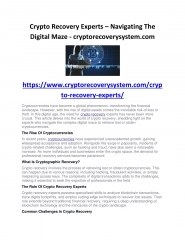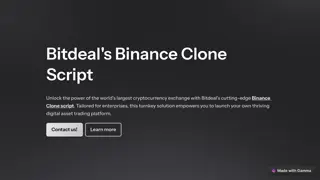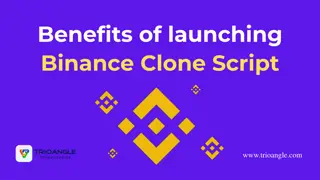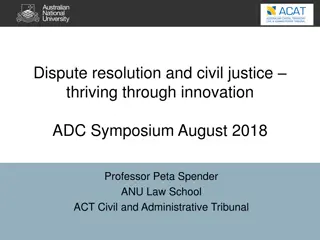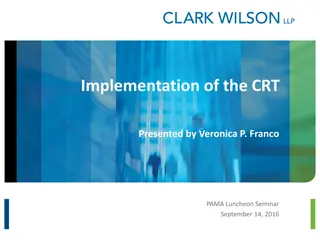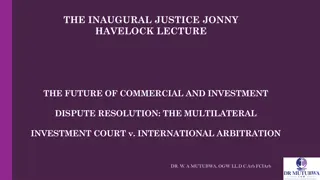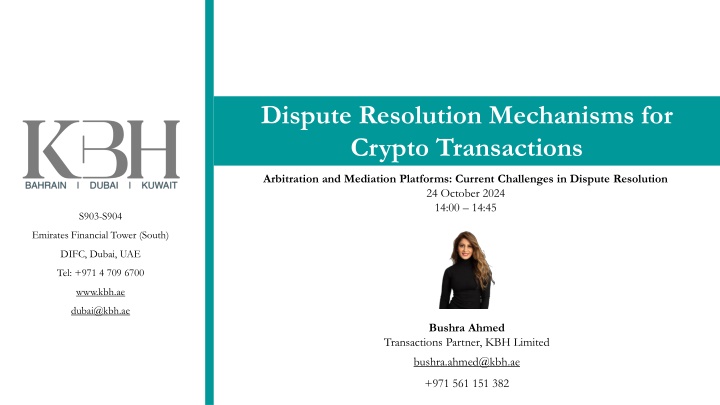
Challenges in Crypto Dispute Resolution
This presentation explores the evolving role of arbitration and mediation in resolving crypto disputes. It discusses current challenges, including jurisdictional issues, enforceability of awards, technical complexity, and regulatory clarity. The importance of alternative dispute resolution in crypto cases is highlighted, focusing on speed, efficiency, and confidentiality. Real case studies from KBH Law Firm and other jurisdictions provide practical insights.
Uploaded on | 3 Views
Download Presentation

Please find below an Image/Link to download the presentation.
The content on the website is provided AS IS for your information and personal use only. It may not be sold, licensed, or shared on other websites without obtaining consent from the author. If you encounter any issues during the download, it is possible that the publisher has removed the file from their server.
You are allowed to download the files provided on this website for personal or commercial use, subject to the condition that they are used lawfully. All files are the property of their respective owners.
The content on the website is provided AS IS for your information and personal use only. It may not be sold, licensed, or shared on other websites without obtaining consent from the author.
E N D
Presentation Transcript
Dispute Resolution Mechanisms for Crypto Transactions Arbitration and Mediation Platforms: Current Challenges in Dispute Resolution 24 October 2024 14:00 14:45 S903-S904 Emirates Financial Tower (South) DIFC, Dubai, UAE Tel: +971 4 709 6700 www.kbh.ae dubai@kbh.ae Bushra Ahmed Transactions Partner, KBH Limited bushra.ahmed@kbh.ae +971 561 151 382
INTRODUCTION Objectives of the Presentation 01 Explore the evolving role of arbitration and mediation in resolving crypto disputes. Discuss current challenges in dispute resolution for crypto-related cases. Present case studies from KBH Law Firm and other jurisdictions, highlighting practical insights. Relevance of the Topic 02 With the growing volume of crypto transactions, traditional legal systems are adapting, leading to the rise of alternative dispute resolution (ADR) mechanisms globally.
The Importance of ADR in Crypto Disputes Why Arbitration and Mediation for Crypto? o Speed and efficiency in resolving complex, cross-border crypto disputes. o Confidentiality and expertise in specialised areas like digital assets and blockchain. o Crypto disputes come in all shapes and sizes. Some may raise novel legal issues such as what law applies to a blockchain transaction in the absence of a governing law clause or whether a binding dispute resolution clause can be embedded in a smart contract. o However, where the disputing parties relationship is governed by a traditional contract, which will frequently be the case, lawyers will already be familiar with many classes of crypto disputes, and the legal issues they raise, because they also arise in the context of other types of disputes: o Although the substantive legal issues that arise in crypto disputes may therefore be familiar to lawyers, the same will often not be true of disputed factual issues. For example, input from industry experts may be required for lawyers to understand how a DeFi platform s risk management system operates and whether it is in line with market practice. Accordingly, like in construction disputes, lawyers may find it necessary to obtain expert advice to fully evaluate the merits of their client s case.
Current Challenges in Crypto Dispute Resolution Jurisdictional Challenges o Decentralized nature of crypto makes jurisdiction selection critical. 01 Enforceability of Awards o Difficulties in enforcing arbitration awards in jurisdictions without crypto asset recognition. o Example: Enforcement of crypto arbitration awards across Japan and other jurisdictions with varying regulations. 02 Technical Complexity o Necessity for technical expertise in blockchain during proceedings. 03 Lack of Regulatory Clarity o Unclear legal frameworks in some jurisdictions can hinder dispute resolution. 04
Current Challenges in Crypto Dispute Resolution 05 Crypto Regulation, Arbitrability and Public Policy 06 Identifying the Correct Counterparty to the Arbitration o Binance Case 07 Securing Interim Measures Over Crypto Assets o Case Examples \ 08 Valuation Challenges 60 Arbitration Rules and Class Actions.
Challenges 1- 4 1. Jurisdictional Challenges: The decentralized nature of cryptocurrency often complicates the selection of jurisdiction. This can impact where disputes are heard and resolved, as well as which laws apply. 2. Enforceability of Awards: Enforcing arbitration awards related to crypto assets can be difficult in regions where legal recognition of cryptocurrency is lacking. For example, countries like Japan may have differing regulations compared to others, complicating enforcement. 3. Technical Complexity: Blockchain s inherent technical nature means that expertise in the technology is crucial during proceedings to understand the dispute and provide clarity on asset tracing or smart contract execution. Lack of Regulatory Clarity: Many jurisdictions have not yet established clear legal frameworks for cryptocurrency, which can hinder effective dispute resolution and lead to uncertain outcomes.
Challenge 5 -Crypto Regulation, Arbitrability and Public Policy Mainland China, Russia and Qatar, among other jurisdictions, have banned crypto assets or heavily regulated their use. If a Crypto Arbitration is seated in such a jurisdiction, or enforcement of an award is sought there, national courts may rule that crypto disputes are not arbitrable or deny enforcement of awards on public policy grounds. Indeed, in 2020, a court in Mainland China set aside an award concerning a cryptocurrency dispute on public policy grounds.1) Similarly, in 2021, an appellate court in Greece confirmed a court of first instance s judgment that had refused enforcement of an award denominated in bitcoin on public policy grounds Case Example Western Continental Greece Court of Appeal, 27 September 2021, unreported; Court of First Instance Agrinio, 23 October 2018, unreported.
Case Example Western Continental Greece Court of Appeal, 27 September 2021, unreported; Court of First Instance Agrinio, 23 October 2018, unreported o Issue: The Western Continental Greece Court of Appeal addressed whether recognizing a foreign arbitral award granting damages in bitcoin is compatible with Greek public policy under the 1958 New York Convention. o Case Facts: A German national provided a loan of 1.13662301 bitcoin to a Greek resident through a US- based website. The Greek debtor failed to repay, leading to an online US arbitration award in favor of the applicant. o Court's Ruling: The court ruled that recognizing the award would violate Greek public order, as cryptocurrency transactions favor tax evasion, facilitate economic crime, and create insecurity in commercial transactions, harming the national economy. o Commentary: The appellate court upheld the lower court's decision without considering recent developments in cryptocurrency regulation and taxation, suggesting a disconnect from contemporary trends. o Sometimes such risks may be mitigated through careful drafting of a party s request for relief. For example, depending on the jurisdiction, requesting an award of damages quantified in fiat currency of equivalent value to the crypto currency in dispute, rather than the crypto currency itself, may reduce the likelihood of enforcement being denied.
Challenge 6 - Identifying the Correct Counterparty to the Arbitration o Crypto businesses are sometimes organised and operated in an opaque manner. It may not be apparent, based on publicly available information, whether a business uses a conventional corporate structure (e.g., parent company / subsidiary relationship) or even the jurisdiction(s) in which it is based. This can create challenges for Crypto Arbitrations, including with respect to identifying the parties to the arbitration agreement and their role, if any, in the dispute. For example, Binance s User Terms contain an arbitration agreement between the user and Binance Operators ,
CASE EXAMPLE Binance Dispute: International Arbitration and Cryptocurrency Derivatives Context: Claimants: 700 potential traders, six alleging losses exceeding US$20 million. Dispute involves cryptocurrency derivatives trading on Binance. Total Claims: Estimated to exceed US$100 million. Derivatives are contracts linked to the value of financial assets, here tied to volatile cryptocurrencies. Key Issue: Traders unable to access accounts during a highly volatile cryptocurrency event due to a Binance platform outage. Allegation: Platform failure prevented traders from limiting losses or adding collateral to avoid liquidation.
Binance Dispute: International Arbitration and Cryptocurrency Derivatives Key Legal Challenges Binance Arbitration Context Identifying Proper Parties: Binance's corporate structure is opaque, complicating the identification of responsible legal entities. Arbitration Clause: Binance s Terms of Use reference Hong Kong International Arbitration Centre (HKIAC) arbitration and Hong Kong law. Entities Involved: Binance may selectively determine which entity is liable due to ambiguous Terms of Use. Substantive Legal Standards & Arbitrability: Hong Kong bans unlicensed derivatives trading, raising concerns over legality. Binance Holdings Limited (Cayman Islands). Binance Limited (Hong Kong). Class Arbitration Waiver: Dispute over whether the claimants can pursue class arbitration. Questions arise about applying Hong Kong law to an international, decentralized service.
Binance Dispute: International Arbitration and Cryptocurrency Derivatives Cryptographic Assets & Enforcement Conclusion Uncertainty in Legal Status: Cryptographic assets' legal status is unclear in many jurisdictions. Complexity: The Binance arbitration case highlights the challenges of applying traditional legal frameworks to the decentralized, global, and volatile nature of cryptocurrency trading. On-Chain Enforcement: Blockchain technology may enable enforcement via smart contracts. Traditional arbitral institutions are considering new rules for smart contract disputes. Future Implications: This case may influence the development of legal standards for enforcing awards in crypto-related disputes.
Challenge 7 Securing Interim Measures o Crypto businesses main assets are generally not traditional assets, like real estate, but crypto assets. Interim measures can therefore be essential in Crypto Arbitrations given the potential for crypto assets to be dissipated in seconds, with only a few mouse-clicks. While the legal issue of whether crypto assets are property remains controversial in many jurisdictions, this has not stopped courts in Hong Kong and Singapore from granting proprietary injunctions over crypto assets. English courts have also been prepared to grant injunctions over crypto assets. Indeed, the English courts have shown an admirable willingness to embrace technology in the context of crypto disputes, including by allowing proceedings to be served via an NFT on the blockchain. Emergency arbitration may also offer a viable method for obtaining interim measures over crypto assets, particularly where emergency arbitrators are prepared to grant urgent preliminary orders .
CASE EXAMPLE CLM v CLN and others [2022] SGHC 46 Key Legal Precedent: The court recognized that cryptocurrencies can give rise to proprietary rights, meaning they are capable of being protected by legal mechanisms like injunctions. Cryptocurrencies were determined to have characteristics of property, such as definability and permanence. Facts of the Case: The plaintiff's cryptocurrency, valued at over US$7 million (109.83 Bitcoin and 1,497.54 Ethereum), was misappropriated by unknown individuals. The stolen assets were traced to wallets controlled by cryptocurrency exchanges in Singapore. Court Rulings: The court granted a proprietary injunction and a worldwide freezing injunction to prevent the unknown thieves from dealing with the stolen cryptocurrency. The court also issued disclosure orders against the cryptocurrency exchanges involved to obtain information about the accounts where the stolen assets were transferred. Implications: This decision sets a significant precedent in Singapore, affirming that courts can protect cryptocurrency owners and enforce legal remedies even against unidentified individuals. It also highlights the challenges of cryptocurrency asset recovery, especially when fraudsters attempt to obscure their identity using digital tools like VPNs.
CASE EXAMPLES FYan Yu Ying v Leung Wing Hei [2022] HKCFI 1660; Nico Constantijn Antonius Samara v Stive Jean Paul Dan [2022] HKCFI 1254 AA v Persons Unknown [2019] EWHC 3556 (Comm).
CASE EXAMPLES D Aloia v Person Unknown & Others [2022] EWHC 1723 (Ch) Case Overview: Fabrizio D'Aloia, a victim of cryptocurrency fraud, sought legal action to recover over $2.1 million in USDT and $230,000 in USDC that had been misappropriated by unknown individuals. Innovative Legal Approach: The court allowed service of proceedings via non-fungible token (NFT), marking a legal first, where an NFT was airdropped into the fraudsters wallets to notify them of the case. Injunction and Disclosure: The court granted an injunction to freeze the stolen assets and compelled cryptocurrency exchanges, including Binance, to disclose information to help trace the fraudsters. Significance: This case set a precedent in using NFTs for legal notices and highlighted the evolving legal framework around cryptocurrency fraud and asset recovery.
Challenge 8 -Valuation Challenges Valuing crypto currencies can be straightforward since there are frequently readily available quoted prices similar to observable commodity prices. However, difficult issues can arise where the crypto currency is illiquid, including with respect to the bid-ask spread and purchase price premium. Valuing crypto businesses may also pose problems. One key challenge is the lack of comparable publicly listed companies with sufficient and robust financial information to conduct a market-based valuation. Taking the crypto exchange industry as an example, the only major publicly listed exchange is Coinbase and its market observed pricing data only goes back to 14 April 2021 when it was publicly listed. Another key challenge is assessing a crypto business future prospects at the valuation date and identifying corresponding implications on the key value drivers. For example, in an exchange, higher trading volume will generate higher transaction revenue and profit, resulting in a higher valuation. Forecasting future trading volumes may not be straightforward where the valuation date falls in a period of significant market volatility as seen during the Crypto Winter. Indeed, with the sharp decline in cryptocurrency values since 2021, the choice of valuation date can significantly impact the quantification of damages. Similarly, given this market volatility, the damages available under a tort claim may be very different from those under a contractual claim given the different measures of damages that can apply to such claims.
Challenge 9 -Arbitration Rules and Class Actions Most institutional arbitration rules are already sufficiently flexible to allow arbitrators to adapt procedures suitable for Crypto Arbitrations. However, their limits are already being tested in certain respects, with one hot topic being class- action style disputes. For example, when a crypto exchange experiences an outage, there may be hundreds of impacted parties, each with a relatively small claim against the exchange. Class-actions could help address access to justice concerns in these situations since it would otherwise be uneconomical for each individual party to bring a separate arbitration. Whether the creative application of joinder and consolidation mechanisms in arbitration rules, for example, can accommodate class-actions remains to be seen.
Conclusion Crypto Arbitration is still at an early stage of development. This post has identified several challenges but others will undoubtedly emerge over the coming months as arbitral tribunals and national courts are exposed to more crypto disputes. It will be interesting to see how these challenges are addressed and also how much traction competitors to traditional arbitration, like decentralized blockchain- based arbitration services such as Kleros (explored here), can gain in the burgeoning crypto dispute market.
Mediation for Crypto Disputes Why Mediation in Crypto? o Effective for preserving relationships and reaching practical, business-oriented solutions. Case Example Case Example Global Case Reference: Gibraltar International Bank Ltd v Nexo (UK, 2021) Mediation in Cross-Border ICO Dispute Resolved token issuer-investor disputes without escalating to litigation. Demonstrated how mediation can address disputes between banks and crypto platforms.
Mediation for Crypto Disputes Why Mediation in Crypto? o Effective for preserving relationships and reaching practical, business-oriented solutions. Case Example Case Example Global Case Reference: Gibraltar International Bank Ltd v Nexo (UK, 2021) Mediation in Cross-Border ICO Dispute Resolved token issuer-investor disputes without escalating to litigation. Demonstrated how mediation can address disputes between banks and crypto platforms.
Case Study: Mediation in NFT Dispute Facts: Dispute over authenticity and breach of contract related to NFT purchase. Jurisdiction: France. Strategy: Mediation resulted in compensation in cryptocurrency, preserving the platform s reputation. Outcome: Demonstrates how mediation can resolve niche disputes in digital art and NFTs.
Emerging Platforms for Crypto ADR 1. Jurisdiction-Specific Arbitration Platforms o DIFC-LCIA (Middle East), SIAC (Asia). o Example: Singapore s B2C2 Ltd v Quoine Pte Ltd case. 2. Blockchain-Based Arbitration Platforms o Kleros (France) offers decentralized arbitration for blockchain disputes. 3. Online Mediation Platforms o Virtual mediation platforms increasingly handling cross-border crypto disputes.
Future of Crypto Dispute Resolution 1. Expansion of Specialized Arbitration Rules o Jurisdictions like the UAE, Singapore, and Germany are developing clearer rules for digital assets. 2. Growth of Decentralized Dispute Resolution (DDR) o Platforms like Kleros are gaining prominence. 3. Enhanced Role of Regulators o Jurisdictions like Germany are leading the way in adopting ADR mechanisms specifically for crypto.
CONCLUSION Summary of Key Points 01 Arbitration and mediation are becoming the go-to mechanisms for resolving crypto disputes globally. Example cases from jurisdictions like Singapore, France, the UK, and the UAE demonstrate the adaptability of ADR in crypto disputes. Looking Ahead 02 Expect further developments in specialized rules, decentralized platforms, and increased regulatory clarity across jurisdictions.
Q&A Arbitration and Mediation Platforms: Current Challenges in Dispute Resolution S903-S904 Emirates Financial Tower (South) DIFC, Dubai, UAE Tel: +971 4 709 6700 www.kbh.ae dubai@kbh.ae

